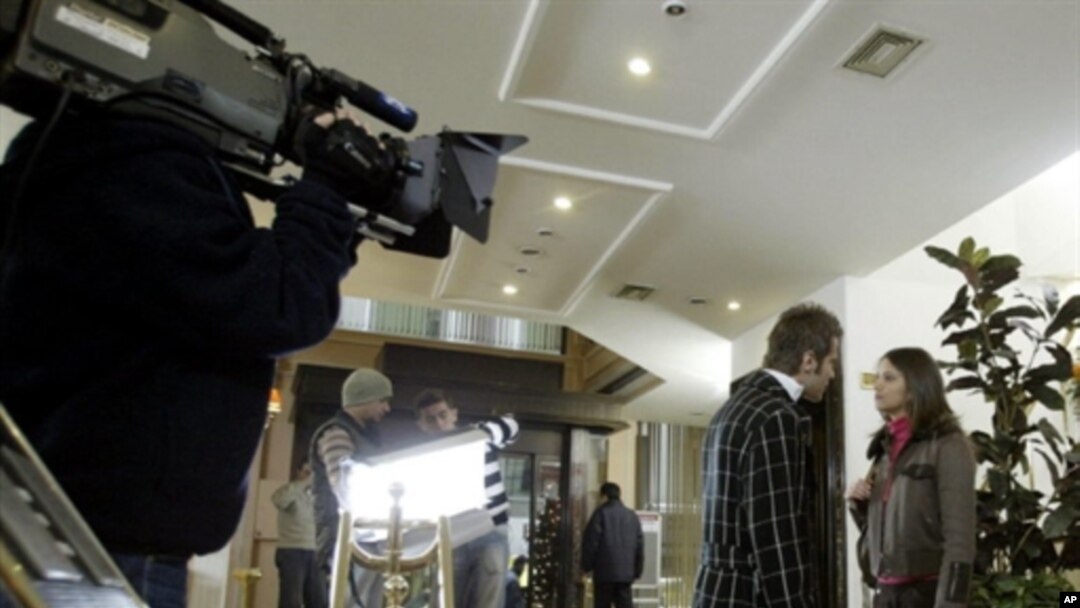Turkey's appetite for romance and drama is well documented in its love for the more than 60 TV soap operas currently being broadcast in the country. And the tawdrier the better, it seems. But not everyone is a fan. Some factions within the government are promising to bring the soaps under control.
For Cemile Kaptan, 30, it is another day and the beginning of another TV soap opera. Like with so many episodes, it's about forbidden relationships. And for Kaptan and much of Turkey, these programs have become a central part of life.
"I am watching them because I cannot think about anything else," she said. "I cannot think about my problems. I cannot think about where Turkey is really going. I cannot think about anything. But I am just concentrated on that. I actually watch something every night, sometimes two. I know that it's stupid, especially these love stories, and guys being with their uncle's wives. There is a guy who's sleeping with both sisters. So it's stupid and I am happy with that because my brain is not working. It's actually a drug."
Through the small screen, Turkish television soap operas have a big influence at dinner tables, boardrooms and in parliament, where lawmakers reportedly sometimes leave the debating chamber to watch their favorite programs.
TV 8's chief, Haluk Sahin, says soap operas have become the lifeblood to the more than 50 television channels in Turkey. He says sex sells best.
"Once a series is successful, all the other channels start to imitate that particular story line," said Sahin. "There is this spiral to get more and more risqué in the response to the need for larger audiences. The main thing that counts, in this market, is the ratings you get. And, ratings mean money. The Turkish advertising pie has been growing and is now approaching $4 billion."
But not everyone is as enthusiastic. Turkey, although secular, is overwhelmingly Muslim and largely conservative.
The ruling AK party has its roots in Islam and its minister for family affairs, Selma Aliye Kavaf, says these programs are out of control and are threatening the country's social fabric.
Kavaf says it is important to protect and sustain the significance of families and their role in the transfer of values. She says certain TV programs have a harmful effect on the dignity of children and the family. There are ways of controlling the broadcasting of these programs and, she says, the government is considering new ways to do so.
Already, many soaps have been fined for their erotic content. But Kavaf is taking it a step further by creating a committee called the "Adult Monitoring Board Against Obscenity." The board will have powers to ban specific episodes of soap operas if they violate the code protecting morality and the family. In their place, television channels would air programs that advocate family values.
But TV 8's Haluk Sahin says the minister is playing to her party supporters and he doubts that she would enforce the regulations.
"There have been outcries of pornography or immorality in response some of these scenes," added Sahin. "But these also are the scenes that have attracted the greatest audiences. People complain, but they watch."
Back at the home of Cemile Kaptan, after nearly three hours, the latest episode of her soap has finally finished. It was a good episode, she says, because the lead character finally seduced his brother's wife. Kaptan says banning these programs is unthinkable.
"What would be the reaction? People would go just out of their minds because everybody is thinking like me," said Kaptan. "Why does everybody watch them? They can't ban them; they cannot ban them."
With a general election due in less than a year, many analysts say such optimism is well placed. They say that with the ruling AK party facing a rejuvenated opposition, the last thing the party needs is outraged viewers, many of whom are its own parliamentary deputies.


